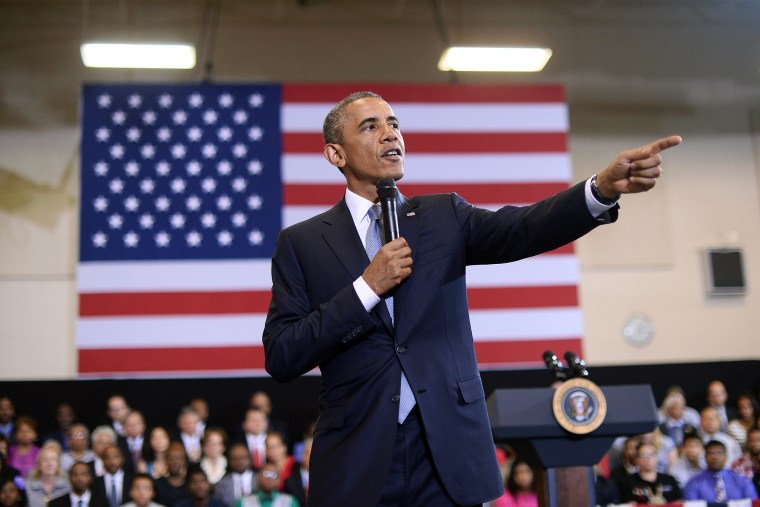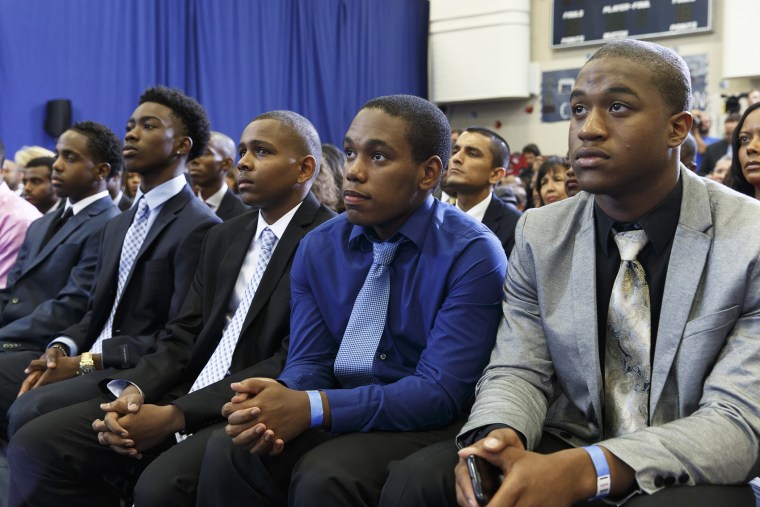Washington, D.C.— President Barack Obama announced the expansion of My Brother’s Keeper Monday afternoon and reaffirmed his ongoing commitment to bolstering the lives of young minority men and boys.
“This is not something that’s just a one-off that’s going to happen one time and then we’re done," Obama said during a town hall at the Walker Jones Education Center in Washington. “This is a movement we are trying to build over the next year, five years, 10 years, so that we can look back and say we were part of something that reverses some trends that we don’t want to see.”
My Brother’s Keeper is Obama’s signature effort to help remedy the dismal outcomes suffered disproportionately by young men and boys of color. The disparities extend through most American institutions, including too many being pushed out or dropping out of school, involvement in the criminal justice system and as victims and perpetrators of violence.

On Monday, Obama announced an expansion of the initiative that includes commitments by 60 of America’s largest school districts and a host of new foundations and agencies as well as major corporations, including the NBA and its players and retired players associations, AT&T and the Emerson Collective, started by Laurene Powell Jobs, the widow of Apple co-founder Steve Jobs. The new commitments total about $104 million and include aggressive mentorship and recruitment campaigns targeted at minority males.
The goals of My Brother’s Keeper are broadly to help young men of color at critical moments of their lives, including early literacy, high school and in the teens and early 20s when so many are sucked into the so-called school-to-prison pipeline.
“We want fewer young men in jail, we want more of them in college,” Obama said on Monday. “We want fewer young men on the streets, we want more of them in the boardrooms. We want everybody to have a chance to succeed in America.”
The initiative, launched earlier this year, drew on some of the country’s wealthiest foundations and philanthropists who pledged $200 million aimed at this demographic.
The audience at Monday’s town hall included a couple hundred D.C.-area public school students, the mayors of New Orleans and Philadelphia, administration officials including Secretary of Education Arne Duncan and White House Senior Advisor Valarie Jarrett, as well as a number of other notables, including NBA Commissioner Adam Silver and Chris Paul, an NBA All-Star and president of the league’s player’s union.
Paul walked on stage with President Obama, and in introducing Obama to the audience, Paul said that My Brother’s Keeper is an “opportunity to stand together as athletes, as parents, as mentors and as leader in our communities to show our young men and boys of color with our actions that we are behind them and that their success matters.”
The expansion of My Brother’s Keeper comes with a slew of new commitments from major corporations. The NBA groups have pledged support for a new public service campaign primarily designed to recruit 25,000 minority male mentors. AT&T has pledged $18 million this year to support mentoring and educational programs targeted at students at risk of dropping out of school. The Emerson Collective has committed $50 million to work with school districts to launch a competition to find the best designs for high schools of the future.
The College Board will invest more than $1.5 million with a goal of ensuring that 100% of African-American, Latino and Native-American students with strong advanced placement potential are enrolled in AP classes before graduation.
The Citi Foundation is committing $10 million over the next three years to create a national volunteer program to help 25,000 young people in 10 cities across the country develop college and career readiness skills. And Discovery Communications will invest more than $1 million to create original programming to breakdown stereotypes and negative public perception of boys and men of color.
New collaborations between government agencies, including the Corporation for National and Community Service, the Department of Justice, AmeriCorp and the USDA will spur about $13.8 million toward enrolling disconnected youth in AmeriCorps and giving young minority men the opportunity to help restore the nation’s forests and grasslands.
"This is not something that’s just a one-off that’s going to happen one time and then we’re done."'
In conjunction with Monday’s announcements from the White House, Earvin “Magic” Johnson and Joe Echevarria, the CEO of Deloitte, launched the National Convening Council, an effort spearheaded by the Boys and Men of Color Private Sector Initiative to direct significant resources towards young men and boys of color.
Six months ago, when Obama launched My Brother’s Keeper, he did so in the shadow of the acquittal of Trayvon Martin’s Killer, George Zimmerman. The killing and eventual acquittal were defining moments in Obama’s presidency and his course correction on what critics had described as his inattention to matters of race. Obama met privately with groups of young, mostly black men in his hometown of Chicago and heard their stories of feeling disconnected, lost, forgotten.
“I’ve had a chance to talk to some young people in the past and I always say that I see myself in the young men who are coming up now,” Obama said on Monday. “When I was in my teens I didn’t have a father in the house, it took me awhile to realize that I was angry about that and I acted out in some ways.”
“You’re where I was 35 years ago,” Obama told the audience, as he had done when he initially announced the program's launch.
“The only difference between me and the extraordinarily talented young men I see all across the country is that I was living in a pretty forgiving environment, so if I made a mistake I often had a second chance or a third chance and sometimes a fourth chance,” Obama said. “The costs of making mistakes, they weren’t deadly. I wasn’t going to end up shot, I wasn’t going to end up in jail.”
Attorney General Eric Holder said Monday that he is pleased with the progress that My Brother’s Keeper has made in the half-year since it launched and that he expects the growth and energy around the initiative to continue to grow.
“This something that is well thought out and I think it’s getting a really good response and I think it’s involving people who don’t normally talk to one another about these issues and entities, sectors of our society that don’t normally talk to one another,” Holder told msnbc. “I think having the president’s personal commitment and his personal involvement is really helping.”
In recent years, and in the wake of the Trayvon Martin case, Obama and Holder, both of whom are black, have talked at length about their experiences being black in America.
“I grew up in a lower middle class neighborhood in Queens, New York, and I think of all the advantages I had by having a dad there and guys who grew up with me on the block and are in fundamentally different places,” Holder said. “Drug problems. Time in jail. And how to come up with ways in which we make my path the more regular one as opposed to the way too many people, who are my peers, ended up.”
President Obama also addressed notions of fatherhood and the impact a consistent father figure can have on a young person’s life.
During a question-and-answer portion of the town hall meeting, a young man asked Obama how he learned to become a good father. Obama told the young man that he’d only met his father once when he was 10 years old during a month-long visit.
“But I had this mom who just loved me a lot and grandparents who loved me a lot,” Obama said. “And to all the single moms out there, we appreciate you for what you accomplish and what you do.”
He also said becoming a father was the greatest joy of his life and that it was important for him to just be there.
“You get out of it at least as much as you are putting in,” he said.
“I feel inspired,” said Gerald Evans, 17, a rising senior in an area high school, of Obama's announcement. “I think it was a good thing having athletes come out and show their presence, letting us know that other people have our back in the future.
“A lot of us don’t really know the politicians but we know the basketball players that’s on TV,” he said. “To have them here showing their faces, it’s really big.”
